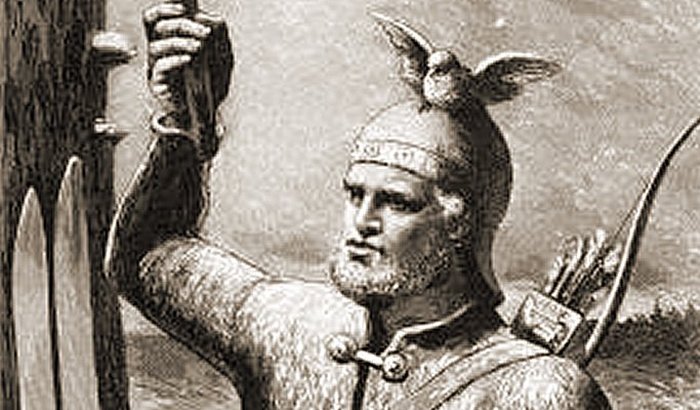A. Sutherland - AncientPages.com - In Norse mythology, Ullr (also known as Ullr, Uller) is a patron of winter, a handsome skier, skater, hunter, and an excellent archer. His extraordinary skills were often prized in skaldic poetry.
He never missed the target, no matter how far and small it was. It's good to call him into a fight. As he was the fastest skier, no one could compete with him. From him, people learned this art.
Snorre Sturluson says about him briefly in his Edda:
"Ullr is named one, son of Siv and stepson of Thor," and associates him with the bow and with snow-shoes. In another place in Eddan, Snorre says that Ullr can be called the Ski god, the Bow god, the Hunting god, and the Shield god.
Saxo Grammaticus (c. 1160 – c. 1220), the 12th-century Danish historian and theologian, tells us that Ullr crossed the sea on a magic bone, suggesting skates.
Most depictions show Ullr as the god of hunting, archery, and skiing, with a large quiver full of arrows, a large bow, and often skis. In the northern regions, the skis were sometimes made of bone and bent upward, like the nose of a ship.
Ullr was also known as the 'god of the shield' because, if necessary, he could use it as a boat.
Some myths tell that the god Ullr used to spell magical runes over the bone, turning it into a vessel that carried him above the earth and sea at his request in any direction.
It is known that Ullr's mother was the goddess Sif, and his biological father was Orvandil, a frost giant, a star hero, and the first husband of Sif. She later married Thor, who became the stepfather of Ullr.
Ullr was married to the former wife of Njord, Skadi, the goddess of winter and cold. These two liked winter, snow, frozen landscapes, and skiing, and as they had much in common, they lived in perfect harmony. But in some versions, Ullr and Skadi were only sports competitors and hunting companions.
Ydalir ("yew-dales") was Ull's home in Asgard, a place where yew trees (his favorite sacred trees) grew. As a highly skilled bowman, Ullr knew that yew's hardwood was the best material to manufacture a bow.
Saxo and Snorri are the primary sources of information about Ull, and other references that mention him are scattered and few. He appears in Grímnismál (or "Song of Grimnir"), compiled by an unknown scribe in Iceland around 1270, and included in the "Poetic Edda" (the Elder Edda), which is a collection of Old Norse poems dedicated to Viking lore, heroic deeds of gods and mortals.
In 'Gods and Myths of Northern Europe,' H. R. Elis Davidson writes: "in Norway and Sweden, his name [Ull] occurs in place names in two forms, Ullr and Ullin. Places called after him are often near those called after Frey, Freja, Njord, and Njord's wife, Skadi, so it seems natural to assume that he was associated with the Vanir. There is little trace of his worship in Denmark, but a third-century scabbard in a Danish bog bears a name in runes that means servant of UU,' and its owner may have been a worshipper of the god. Ull's name is related to the Gothic word meaning' majesty,' or' glory,' and because of this, it has been thought that he was an early Germanic sky god..."
Seduction of Rind And Odin Faces Shame
An Icelandic bald, Skald Kormak (935 - ca.970), stated, "Odin practiced sorcery to win Rind." According to Gesta Danorum ("Deeds of the Danes") by Saxo, magic runes were employed by Odin in winning Rind.
In Gesta Danorum, Saxo reports that Ull led the council of the Aesir gods for about ten years after the gods decided to ban Odin from Asgard. Odin was punished for his immoral behavior, which resulted in the seduction of the Russian king's daughter Rind (Rindr), who was once worshipped as a goddess and had her sanctuary - "Rind's sanctuary."
Illustration from an 18th-century Icelandic manuscript showing Ullr on his skis and with his bow. https://commons.wikimedia.org/wiki/File:Manuscript_Ullr.jpg - Public Domain
After Balder's death, Odin consulted seers on how to get revenge for his death. He consulted seers who predicted he would have another son with Rind. To achieve this goal, Odin used sorcery and women's clothing (disguised himself as a medicine woman) and three times approached Rind but without success.
Finally, he took advantage of her weakness and illness and managed to rape her. The giantess Rind gave birth to Odin's son, Vali (Váli), who grew to adulthood within a day and avenged Balder's death.
According to Saxo, the Aesir gods were horrified and annoyed by his act. Disappointed that Odin had disgraced his divinity, they deposed him from the throne and put Ull in his place. There were also other indications that Odin had closed down the government for some time to come back later, and yet another version suggests that Odin was only absent for the long winter months.
Ullr Was Almost As Important As Odin
At some time in history, Ullr was just as important as Odin. During his ten-year reign as the king of Asgard, he even took the name, Odin. Swedish and Norwegian place names testify that Ullr once had a prevalent cult and probably belonged to an older group of pre-Christian Nordic deities.
The "Elder Edda" gives Ullr a prominent place by mentioning him as number two after Thor and saying: "Ullr and all gods."
Updated on September 9, 2022
Written by – A. Sutherland - AncientPages.com Senior Staff Writer
Copyright © AncientPages.com All rights reserved. This material may not be published, broadcast, rewritten or redistributed in whole or part without the express written permission of AncientPages.com
Expand for referencesReferences:
Sturluson S. The Younger Edda; Also called Snorre's Edda, or The Prose Edda
Saxo Grammaticus, Gesta Danorum
Grimes, H. Y. The Norse Myths
